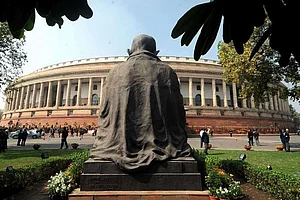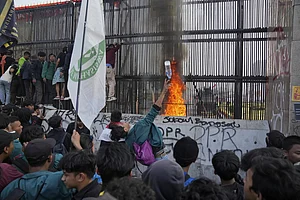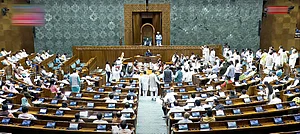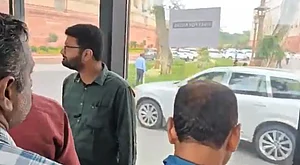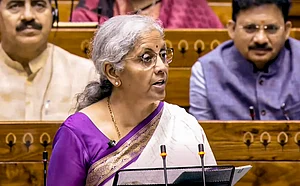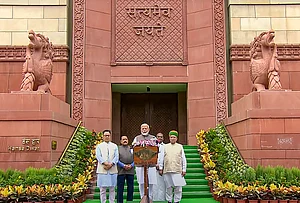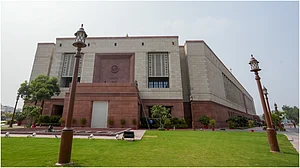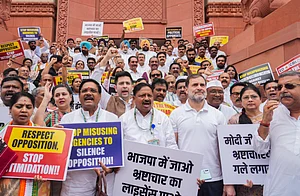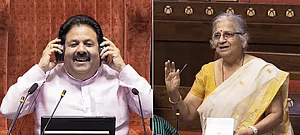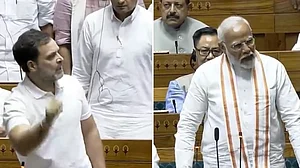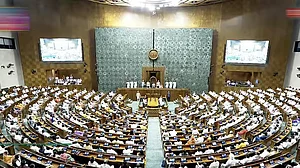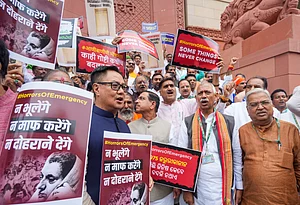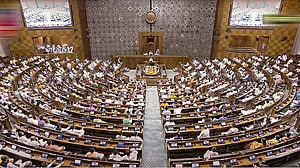
Name: The Parliament of India
The parliament of India known as Bhāratīya Sansad, is the supreme legislative body of the Republic of India. It operates as a bicameral legislature consisting of the Rajya Sabha (Council of States) and the Lok Sabha (House of the People). The Parliament was established on January 26, 1950, and is housed in Sansad Bhavan, New Delhi. The President of India serves as the ceremonial head of the Parliament and has the authority to summon and prorogue either house or dissolve the Lok Sabha. However, these powers are exercised only upon the advice of the Prime Minister and the Union Council of Ministers.
The Parliament of India represents the most significant democratic electorate globally, with over 912 million eligible voters in 2019. The Parliament meets in the Sansad Bhavan, and on May 28, 2023, Prime Minister Narendra Modi inaugurated the New Parliament Building, located adjacent to the old structure. The Parliament's composition includes the Lok Sabha, with 543 members whom the citizens of India directly elect, and the Rajya Sabha, with a sanctioned strength of 250 members, of which the President nominates 12. The Lok Sabha members are elected based on a universal adult franchise representing parliamentary constituencies nationwide. The Rajya Sabha members are elected by the elected members of all state legislative assemblies through proportional representation.
The Parliament of India has legislative powers, including enacting laws on subjects listed in the Union and Concurrent lists under the Constitution of India. Bills can be introduced in either house and upon approval, they become laws after receiving the President's assent. The Parliament also has the power to amend the Constitution with the support of a special majority. It holds exclusive authority over residuary powers, which cover matters not included in the Union or State Lists.
The Parliament exercises financial powers, including formulating and approving the Union Budget. It examines government proposals for revenue generation and expenditure. It can levy and collect taxes, including income tax, customs and excise duties, and the Goods and Services Tax (GST). The Parliament scrutinises government expenditure through debates and discussions on budgetary allocations.
In its executive role, the Parliament exercises control over the Council of Ministers, holding the government accountable for its policies and actions. If the government fails to enjoy the majority's support in the Lok Sabha, the Parliament can remove it from power through a vote of no confidence. Members of Parliament have the right to raise questions, seek clarifications, and move motions regarding the functioning of the government.
The Parliament also has oversight powers. During Question Hour, members can ask ministers questions to clarify matters of public interest. The Parliament appoints various committees, such as the Public Accounts Committee (PAC), the Estimates Committee, and the Committee on Public Undertakings, to oversee and examine government policies and programs and their implementation. The Parliament can initiate impeachment proceedings against the President, Vice President, and Judges of the Supreme Court and High Courts for violating the Constitution.
The Parliament of India meets at least twice a year, with three regular sessions: the Budget Session, the Monsoon Session, and the Winter Session. The Budget Session, held between February and May, focuses on discussing and passing the annual Union Budget. The Monsoon Session, held between July and August, is dedicated to enacting legislation, with members introducing bills, engaging in debates, and deciding on their passage. The Winter Session, held between November and December, comprehensively reviews the government's policies and initiatives. Special sessions may also be convened to address urgent matters or crises.
Parliamentary committees are formed to deliberate specific matters at length. There are two kinds of committees: standing committees and ad hoc committees. Standing committees are permanent and constituted from time to time by the provisions of an act of Parliament or rules of procedure and conduct of business in Parliament. Ad hoc committees are appointed for a specific purpose and cease to exist once they complete their assigned tasks.
Parliamentary privileges grant certain rights and immunities to Members of Parliament, enabling them to perform their duties effectively and ensuring democratic accountability. These privileges include freedom of speech, immunity from legal action for statements made or actions performed within Parliament or its committees, access to information necessary for legislation and oversight, control over internal affairs, and protection from arrest in civil cases during parliamentary sessions.
The Parliament of India also adheres to a code of conduct for its members, focusing on maintaining transparency, avoiding conflicts of interest, ensuring respectful discourse, demonstrating commitment through attendance and participation, exercising parliamentary privileges responsibly, and upholding accountability to the public. In 2022, the Lok Sabha secretariat released a booklet listing unparliamentary words and expressions that, if used during debates, would be expunged from the records of Parliament.






